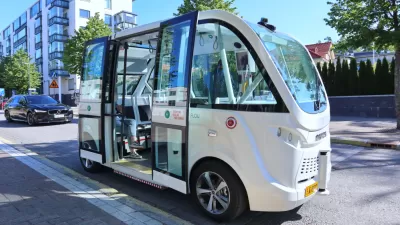Two major automakers have petitioned for the right to test thousands of vehicles without major safety features such as brake pedals and steering wheels.

Petitions from Ford and General Motors to exempt some vehicles with Automated Driving Systems (ADS) from human-operated safety controls are facing criticism from the National Association of City Transportation Officials (NACTO), which claims that the automakers are trying to avoid regulations that help ensure road safety. In an article for Streetsblog, Eve Kessler describes the complaints lodged by NACTO in a letter to the National Highway Traffic Safety Administration (NHTSA).
Automakers for years have tried to get more AVs on American streets even as evidence mounts that the machines aren’t as smart as the companies think they are and pose a danger to pedestrians and other vulnerable road users.
The companies want to introduce 2,500 vehicles annually that would be used for delivery and ride sharing services and forgo steering wheels, brake pedals, and mirrors—“that is, the controls that lets humans take over if the high-tech machinery goes haywire.” According to NACTO’s letter to federal regulators, “The companies ‘must not only establish that the controls, telltales, and devices aren’t needed for vehicles controlled by an ADS, but also prove that the ADS can successfully respond in a manner at least as safe as a nonexempt vehicle with a human driver would.’”
NACTO is also calling on the NHTSA to develop standards specific to autonomous vehicles “in ways that won’t lead to more road deaths and the destruction of cities,” which NACTO has laid out in their Blueprint for Autonomous Urbanism.
FULL STORY: NACTO Pushes Back as Big Auto Seeks Safety Exemption for Driverless Cars

Maui's Vacation Rental Debate Turns Ugly
Verbal attacks, misinformation campaigns and fistfights plague a high-stakes debate to convert thousands of vacation rentals into long-term housing.

Planetizen Federal Action Tracker
A weekly monitor of how Trump’s orders and actions are impacting planners and planning in America.

In Urban Planning, AI Prompting Could be the New Design Thinking
Creativity has long been key to great urban design. What if we see AI as our new creative partner?

Pedestrian Deaths Drop, Remain Twice as High as in 2009
Fatalities declined by 4 percent in 2024, but the U.S. is still nowhere close to ‘Vision Zero.’

King County Supportive Housing Program Offers Hope for Unhoused Residents
The county is taking a ‘Housing First’ approach that prioritizes getting people into housing, then offering wraparound supportive services.

Researchers Use AI to Get Clearer Picture of US Housing
Analysts are using artificial intelligence to supercharge their research by allowing them to comb through data faster. Though these AI tools can be error prone, they save time and housing researchers are optimistic about the future.
Urban Design for Planners 1: Software Tools
This six-course series explores essential urban design concepts using open source software and equips planners with the tools they need to participate fully in the urban design process.
Planning for Universal Design
Learn the tools for implementing Universal Design in planning regulations.
planning NEXT
Appalachian Highlands Housing Partners
Mpact (founded as Rail~Volution)
City of Camden Redevelopment Agency
City of Astoria
City of Portland
City of Laramie





























